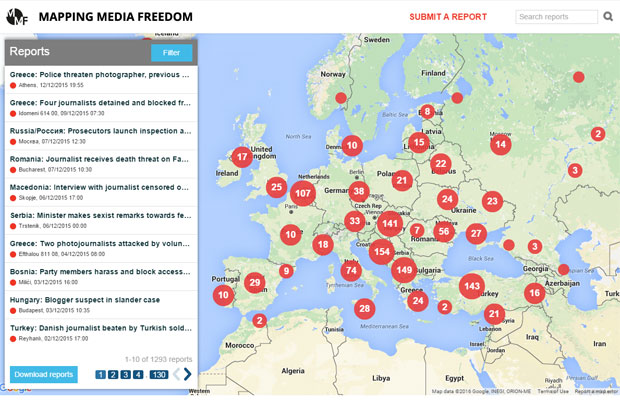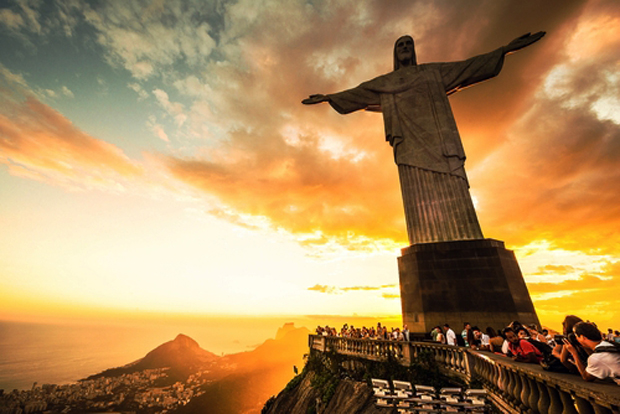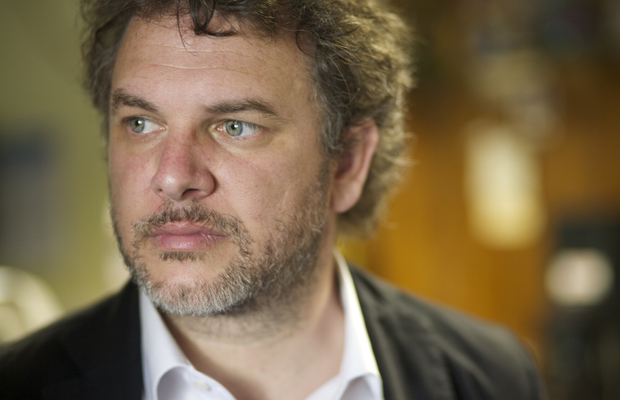8 Jan 2016 | Belarus, Greece, Hungary, Italy, Lithuania, Macedonia, Mapping Media Freedom, News and features, Poland, Portugal, Serbia, Turkey

The attacks on the offices of satirical magazine Charlie Hebdo in Paris in January set the tone for conditions for media professionals in 2015. Throughout the year, Index on Censorship’s Mapping Media Freedom correspondents verified a total of 745 violations of media freedom across Europe.
From the murders of journalists in Russia, Poland and Turkey to the growing threat posed by far-right extremists in Germany and government interference in Hungary — right down to the increasingly harsh legal measures imposed on reporters right across the continent — Mapping Media Freedom exposed many difficulties media workers face in simply doing their jobs.
“Last year was a tumultuous one for press freedom; from the attacks at Charlie Hebdo to the refugee crisis-related aggressions, Index observed many threats to the media across Europe,” said Hannah Machlin, Index on Censorship’s project officer for the Mapping Media Freedom project. “To highlight the important cases and trends of the year, we’ve asked our correspondents, who have been carefully monitoring the region, to discuss one violation each that stood out to them.”
Belarus / 19 verified reports between May-Dec 2015
Journalist blocked from shooting entrance to polling station
“It demonstrates the Belarusian authorities’ attitude to media as well as ‘transparency’ of the presidential election – the most important event in the current year.” — Ольга К.-Сехович
Greece / 15 verified reports in 2015
Four journalists detained and blocked from covering refugee operation
“This is important because it is typical ‘attempt to limit press freedom’, as the Union wrote in a statement and it is not very hopeful for the future. The way refugees and migrants are treated is very sensitive and media should not be prevented from covering this issue.” — Christina Vasilaki
Hungary / 57 verified reports in 2015
Serbian camera crew beaten by border police
“These physical attacks, the harsh treatment and detention of journalists are striking because the Hungarian government usually uses ‘soft censorship’ to control media and journalists, they rarely use brute force.” — Zoltan Sipos
Italy / 72 verified reports in 2015
Italian journalists face up to eight years in prison for corruption investigation
“I chose it because this case is really serious: the journalists Emiliano Fittipaldi and Gianluigi Nuzzi are facing up to eight years in prison for publishing books on corruption in the Vatican. This case could have a chilling effect on press freedom. It is really important that journalists investigate and they must be free to do that.” — Rossella Ricchiuti
Lithuania / 9 verified reports in 2015
Journalist repeatedly harassed and pushed out of local area
“I chose it because I found it relevant to my personal experience and the fellow journalist has been the only one to have responded to my hundreds of e-mails — including requests to fellow Lithuanian journalists to share their personal experience on media freedom.” — Linas Jegelevicius
Macedonia / 27 verified reports in 2015
Journalist publicly assaults another journalist
“I have chosen this incident because it best describes the recent trend not only in Macedonia and my other three designated countries, Croatia, Bosnia and Montenegro, but also in the whole region. And that is polarization among journalists, more and more verbal and, like in this unique case, physical assaults among colleagues. It best describes the ongoing trend where journalists are not united in safeguarding public interest but are nothing more than a tool in the hands of political and financial elites. It describes the division between pro-opposition and pro-government journalists. It is a clear example of absolute deviation from the journalistic ethic.” — Ilcho Cvetanoski
Poland / 11 verified reports in 2015
Law on public service broadcasting removes independence guarantees
“The new media law, which was passed through Poland`s two-chamber parliament in the last week of December, constitutes a severe threat to pluralism of opinions in Poland, as it is aimed at streamlining public media along the lines of the PiS party that holds the overall majority. The law is currently only awaiting president Duda’s signature, who is a close PiS ally.” — Martha Otwinowski
Portugal / 9 verified reports in 2015
Two-thirds of newspaper employees will be laid off
“It’s a clear picture of the media in Portugal, which depends on investors who show no interest in a healthy, well-informed democracy, but rather in how owning a newspaper can help them achieve their goals — and when these are not met they don’t hesitate to jump boat, leaving hundreds unemployed.” — João de Almeida Dias
Russia / 37 verified reports between May-Dec 2015
Media freedom NGO recognised as foreign agent, faces closure
“The most important trend of the 2015 in Russia is the continuing pressure over the civil society. More than 100 Russian civil rights advocacy NGOs were recognized as organisations acting as foreign agents which leads to double control and reporting, to intimidation and insulting of activists, e.g., by the state-owned media. Many of them faced large fines and were forced to closure.” — Andrey Kalikh
Russia / 37 verified reports between May-Dec 2015
TV2 loses counter claim to renew broadcasting license Roskomnadzor
“It illustrates the crackdown on independent local media, which can not fight against the state officials even if they have support from the audience and professional community.” — Ekaterina Buchneva
Serbia / 41 verified reports in 2015
Investigative journalist severely beaten with metal bars
“It’s a disgrace and a flash-back to Serbia’s dark past that a journalist, who’s well known for investigating high-level corruption, get’s beaten up with metal bars late at night by ‘unknown men’.” — Mitra Nazar
Turkey / 97 verified reports in 2015
Police storm offices of Koza İpek, interrupting broadcast
“The raid on Bugün and Kanaltürk’s offices just days ahead of parliamentary elections was a drastic example — broadcasts were cut by police and around 100 journalists ended up losing their jobs over the next month — of how the current Turkish government tries to strong-arm media organisations.” — Catherine Stupp
Mapping Media Freedom
Click on the bubbles to view reports or double-click to zoom in on specific regions. The full site can be accessed at https://mappingmediafreedom.org/
|
11 Dec 2015 | Italy, Mapping Media Freedom, mobile, News and features
For weeks, Rome has been transfixed by the spectacle of the “Capital Mafia” trial, which began on 5 November. The prosecutors are laying bare an alleged network of corrupt relationships between politicians and criminal syndicates in the city. The scandal involves the misappropriation of funding that was destined for city services, according to prosecutors.
But the biggest surprise wasn’t in that “Captial Mafia” courtroom, it was at the district attorney’s office where a complaint filed by the criminal lawyers association denounced 97 journalists for violating the secrecy of investigations, which is a crime under article 114 of the country’s code of criminal procedure. Italy’s foremost and well-respected crime and courts reporters, as well as 24 chief editors, also stand accused of breaching the ethical norms of their profession.
The accusations against the journalists and editors stem from two waves of arrests — December 2014 and June 2015 — of defendants in the “Captial Mafia” trial. The coverage of the arrests and subsequent investigations generated 278 articles across 14 Italian newspapers. The published reports included details gleaned from arrest warrants of 81 people, including politicians, public administrators and alleged members of the mafia. The contents of the warrants were known to the police, prosecutors, the accused and their lawyers, but still formally subject to publication limits until the conclusion of investigations.
The lawyers that made the accusations believe that the journalists should have rigidly respected the limits and that the facts should not have been reported even if they were known to the parties involved.
Supporters of the journalists maintain that the case is too important and that it is vital for newspapers and journalists to inform Italians as fully as possible, especially in connection with a scandal of such vast proportions. Some see it as a form of legal intimidation that cannot be punished and a move to force the case against the defendants to be dismissed in the public mind as a journalistic fiction.
“We are facing a clear attempt to muzzle the press and the journalists. The journalists denounced have reported news that were not covered by the code,” Raffaele Lorusso, general secretary of National Federation of the Italian Press (FNSI), told Index on Censorship. “It is as if these lawyers want to tell to journalists: “Do not write more news concerning our direct beneficiaries otherwise you will be sued.”
One of the defendant’s lawyers denigrated Lirio Abbate, an investigative journalist and 2015 Index on Censorship Journalism Award nominee, who reported mafia activities. For his trouble, Abbate lives under 24-hour police protection due to death threats.
Currently, the decision to pursue charges against the journalists rests with the Court of Rome. Those involved could potentially face trial and a disciplinary penalty.
Mapping Media Freedom
Click on the bubbles to view reports or double-click to zoom in on specific regions. The full site can be accessed at https://mappingmediafreedom.org/
|
12 Jun 2014 | Americas, Brazil, News and features

(Image: Ksenia Ragozina/Shutterstock)
World Cup time! Hurray! An entire month of football! Rejoice as the pubs stay open late for weirdly timed matches! Gasp at your workmates’ expertise on Iran’s deployment of a false 9! Repeatedly smash yourself in the face with your iPad as you read yet another article by a broadsheet columnist complaining that people don’t pay as much attention to literary fiction as they do to sport!
While the competition officially kicks off tonight, the Brazilians, or, specifically, the archdiocese of Rio have dived in with an early tackle, reportedly threatening to sue Italian broadcaster RAI for an advert showing Rio’s famous Christ The Redeemer statue wearing the Jersey of Italy’s Azzurri.
Suing for what, exactly, is not clear. The church’s lawyer, Rodrigo Grazioli, has been quoted as saying “The Archdiocese is deeply offended. It’s as if Brazilian TV were to make a commercial in which mulatto girls engaged in lewd behaviour with the gladiators of the Colosseum.”
Leaving aside the bizarrely specific and racist mention of “mulatto girls”, and the fact that people involved with churches have to make absolutely everything, ever, about “lewd behaviour”, it’s still not clear what the exact complaint is. Is it the suggestion that the colossal statue might support Italy? That Jesus himself might support Italy? Is this about putting any jersey at all on Jesus, or specifically an Italian one? Is there something specifically blasphemous about suggesting that the Son of God is a catenaccio man?
Or is it something rather more prosaic, such as, say, the church claiming to hold copyright over the image of the statue?
If it is that, as the original O Globo newspaper report suggests, then Grazioli and his clients are being more than a little disingenuous in their outrage. If the issue is simply an objection to commercial usage of the image, than that’s what the complaint should be about.
So why the offended line? Why the suggestion of an insult to religion? Because, put simply, it works. Who wants to be offensive?
In Ireland this week, national broadcaster RTE refused to show a sketch as part of the Savage Eye sketch show. The sketch, now leaked on the web features a group of “wild nuns” ogling a muscular Jesus, in a spoof of Diet Coke ads of old. Comic David McSavage, the man responsible for the skit, has said the broadcaster is afraid of Ireland’s blasphemy laws; RTE says its own guidelines will not allow for “undue offence”.
I’m not even sure that, even if one was a supporter of laws against blasphemy, images of hunky Jesus, or Azzurri Jesus would necessarily count as blasphemous, at least not for Catholics.
On a panel on religious art a few years ago, I found myself simultaneously playing the role of token secularist and token Roman Catholic. The other panelists – art critics and Anglicans – were quite keen on abstraction in religious art. I found myself defending the more visceral, more Roman depictions of Jesus and God on the basis that the entire point of Jesus was his manifestation as human.
To ascribe certain human possibilities to him, such as lust, or even supporting a particular sports team, should not be considered transgressive; indeed I recall, in my youth, our parish priest would often offer up prayers for the local Gaelic football club, suggesting at least the possibility of partisanship. And the very fact that nuns are “brides of Christ” is suggestive of, well…
Catholicism doesn’t really have a problem with idolatry either. Catholics complaining about depictions of Christ do not have the same theological basis as Orthodox Sunni Muslims, who at least can point to some rules on portrayals (which is not to suggest that everyone should follow those rules). Catholics, with our brightly painted statues, sacred medals and all the rest, don’t really have a leg to stand on this one.
These squeals of “offence” are really demands for “respect”, in the Corleone sense. And since the Danish Muhammad cartoons, religions have been in a respect-based arms war. Every time you hear a conservative Christian moan that this or that comic or writer “wouldn’t say that about the Muslims”, remember, they are not praising their own faith’s humility, but condemning its timidity. The archdiocese of Rio is playing a version of this game with its claim to be offended by a Photoshopped football jersey. There’s no reason we should play along.
This article was published on June 12, 2014 at indexoncensorship.org
24 Sep 2013 | Europe and Central Asia, Italy
The European Court of Human Rights have today ruled in favour of an Italian journalist sued for defamation, citing Article 10 of the European Convention on Human Rights which protects the right to freedom of expression.
Maurizio Belpietro was convicted in Italy on defamation charges for a story published in national newspaper Quotidiano Nazionale in 2004, when he was paper’s director. The story, penned by an Italian senator, accused Italian judges and prosecutors ‘of using political strategies in their fight against the Mafia.’
Two prosecutors sued both Belpietro and the senator in question, arguing the article was defamatory. The latter was acquitted on the basis that he had written the article in his role as a senator. Belpietro, while also initially acquitted, was in 2009 given a suspended 4-month jail sentence, as well as being ordered to pay substantial sums to the plaintiffs. His appeal was dismissed in 2010.
Belpietro took the case to the European Court of Human Rights, which today ruled that the conviction was in violation of Article 10. He was awarded €10,000 in non-pecuniary damage and €5,000 for costs and expenses.



